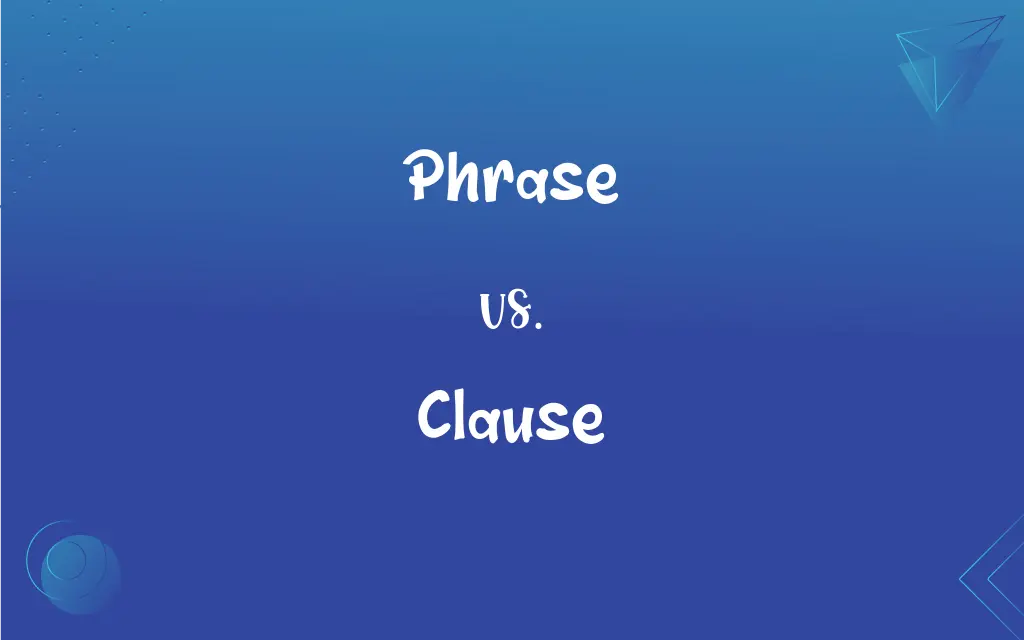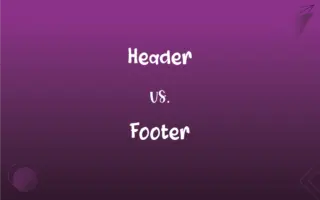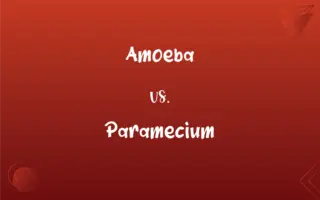Phrase vs. Clause: What's the Difference?
Edited by Aimie Carlson || By Harlon Moss || Updated on October 26, 2023
A phrase is a group of related words without a subject and verb, whereas a clause contains both a subject and a verb.

Key Differences
A phrase is a collection of words that function as a single unit in a sentence but lacks a subject, verb pairing. On the contrary, a clause is a group of related words that includes a subject and a verb. These fundamental distinctions shape how each element functions in language.
Within a sentence, a phrase might serve various roles such as a noun, verb, adverbial, or adjectival unit. For example, in the phrase "under the weather," there's no clear subject doing an action. A clause, however, always carries meaning related to an action being done by a subject, like in the clause "she sings."
There are different types of phrases, such as noun phrases or prepositional phrases, which are built around central words but do not convey a complete thought. Clauses can be independent, expressing a complete thought (e.g., "I love music"), or dependent, which cannot stand alone (e.g., "because it soothes me").
Furthermore, multiple phrases can exist within a single clause. For instance, in the clause "She ran through the park," "She" is a noun phrase and "through the park" is a prepositional phrase. Conversely, a clause can be part of a larger phrase, indicating the intricate relationship between phrases and clauses in sentence structure.
In summary, while both phrases and clauses are foundational components of sentences, they differ in their composition and function. Phrases are groups of words without subjects and verbs, while clauses have both, grounding sentences in actions and actors.
ADVERTISEMENT
Comparison Chart
Basic Definition
Group of related words
Group of related words with a subject & verb
Contains Subject & Verb
No
Yes
Types
Noun, verb, adjectival, adverbial, etc.
Independent, dependent
Example
"on the table"
"She laughs"
Completeness
Doesn't convey a complete thought
Can convey a complete thought
ADVERTISEMENT
Phrase and Clause Definitions
Phrase
A word unit in a sentence.
In a heartbeat is an idiomatic phrase.
Clause
A structural unit in grammar.
Because she was tired is a subordinate clause.
Phrase
A segment of language without a subject and verb.
With a smile is a prepositional phrase.
Clause
A group of words with a subject and verb.
The cat slept is an independent clause.
Phrase
A group of related words.
Bright and early is a common phrase.
Clause
A group of related words that can stand alone or function within a sentence.
While I was eating is a temporal clause.
Phrase
A combination of words expressing a concept.
For the time being is a temporal phrase.
Clause
A segment of a sentence that can express a complete thought.
If you build it is a dependent clause.
Phrase
A sequence of words with a specific grammatical function.
The man with the hat contains a noun phrase.
Clause
A component of a complex sentence.
He left because he was bored has both an independent and dependent clause.
Phrase
A sequence of words that have meaning, especially when forming part of a sentence.
Clause
(Grammar) A group of words containing a subject and a predicate and forming part of a compound or complex sentence.
FAQs
Can a clause be part of a phrase?
Yes, a clause can be nested within a larger phrase.
Is "in the morning" a phrase or a clause?
It's a phrase, specifically a prepositional phrase.
What's the primary distinction between a phrase and a clause?
A phrase lacks a subject and verb pairing, while a clause has both.
What's an example of a verb phrase?
"Have been running" is a verb phrase.
Can a sentence be just a phrase?
No, a complete sentence requires at least one clause.
Can a sentence have multiple phrases and clauses?
Absolutely, many complex sentences contain several of each.
What differentiates an independent from a dependent clause?
An independent clause can stand alone as a sentence, while a dependent clause can't.
Do all clauses convey complete thoughts?
No, only independent clauses do; dependent clauses don't stand alone.
Can a phrase become a clause?
If you add a subject and verb, a phrase can be expanded into a clause.
Why are dependent clauses also called subordinate clauses?
They're "subordinate" because they rely on main clauses to make sense.
Can a sentence begin with a phrase?
Yes, for example, "In the garden, the flowers bloomed."
How do adverbial clauses differ from adverbial phrases?
Adverbial clauses have a subject and verb; adverbial phrases don't.
Is "the quick brown fox" a clause or phrase?
It's a phrase, specifically a noun phrase.
Are there verb clauses?
No, but there are verb phrases.
Why are understanding phrases and clauses important?
They're foundational to sentence structure, aiding in effective communication.
How is a noun phrase different from a noun clause?
A noun phrase centers around a noun, while a noun clause has a subject and verb but functions as a noun.
Are idioms considered phrases?
Yes, idioms like "kick the bucket" are types of phrases.
Can clauses and phrases be combined?
Yes, often a single sentence will contain multiple phrases and clauses.
What's a relative clause?
A type of dependent clause introduced by relative pronouns, e.g., "who" or "which."
Which is longer, a phrase or a clause?
Neither inherently; both can be short or long, depending on content.
About Author
Written by
Harlon MossHarlon is a seasoned quality moderator and accomplished content writer for Difference Wiki. An alumnus of the prestigious University of California, he earned his degree in Computer Science. Leveraging his academic background, Harlon brings a meticulous and informed perspective to his work, ensuring content accuracy and excellence.
Edited by
Aimie CarlsonAimie Carlson, holding a master's degree in English literature, is a fervent English language enthusiast. She lends her writing talents to Difference Wiki, a prominent website that specializes in comparisons, offering readers insightful analyses that both captivate and inform.
































































